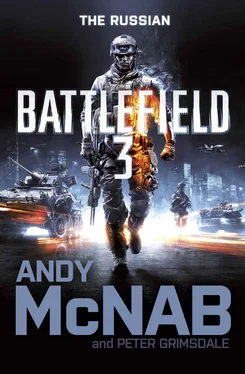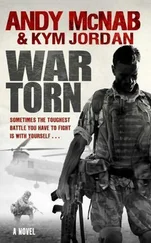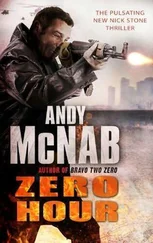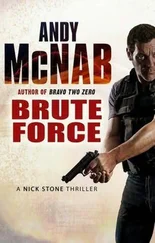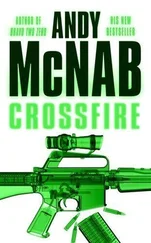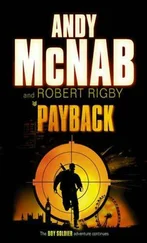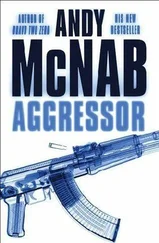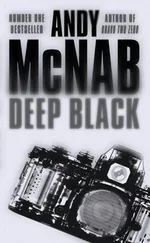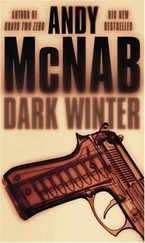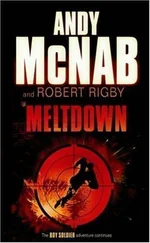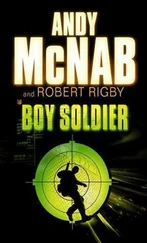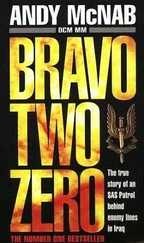It was dark now. The temperature was falling. He was weak and desperately thirsty. The deafness had turned into a steady buzzing in his ears like a malfunctioning radio. He turned and started heading east back towards the border from where they had come he didn’t know how many hours before. He had been walking for an hour or so, stumbling along what was left of the road, when above the buzz he heard the welcome throb of an Osprey. He doubled his pace and immediately tripped and fell on some rubble. He got back up and continued more slowly. The Osprey disappeared over the horizon, but it had given him some hope, something to focus on. As the sound died away he became aware of other sounds in the darkness: shouts, a vehicle being furiously manoeuvred, gears screaming, then shots and a flash. If there was fighting, he reasoned, there had to be good guys as well as bad.
In the area he was now walking into, the quake damage was less intense. The street was still strewn with rubble but most of the buildings were intact. He heard a voice and aimed for it. It was coming from a vehicle, a crashed Humvee. He could see a figure leaning out of it as if waving him on, but the angle was wrong. The soldier, hanging half out of the cab, was dead, his arms splayed. Blackburn focused on the source of the voice. It was several seconds before he registered that it was American, coming from somewhere on the ground — a radio.
‘ . . Roger that, we’re engaging in the vicinity of two two four eight six grid.’
‘ Misfit 1–3, that’s a Roger, rotating in for CAS-EVAC. . ’
He grabbed the radio. The outer casing fell away. He tried to open a channel, no go, so he tossed it aside as right on cue the Osprey reappeared, clattering overhead, its twin rotors tilting into position for a landing. Blackburn found energy he didn’t know he still had as he half stumbled, half jogged in the direction the chopper had gone. He kept it in sight, a dark cutout against the night sky, until its lights came on, flooding the area beneath. He tried to manage the outpouring of relief he felt. He wasn’t there yet, and the lights had provoked a volley of small arms fire followed by a blast and a fireball to the west of where the Osprey was landing. Now it was out of sight behind the buildings.
Suddenly it occurred to him that no one on board knew he was out there heading for it. With fire around it would be on the ground for the minimum time to take on its cargo of wounded. He had to get there before it lifted off again. Not far now: he could feel the wind stirred up by the rotors, the furious crashing sound of the propellers slapping the air. He was running now, with better vision and a powerful turbo charge of adrenalin, leaping over boulders and bodies in his path, not pausing to look at the carnage he was passing — from the quake or the fighting, it was impossible to tell.
The Osprey put down in what had been a square, its rear ramp lowered, two sentries on guard as medics hauled the casualties aboard. He heard the engine revs climb, the air whipping up a tornado of dust. The sentries backed up the ramp as the suspension of the landing gear slackened and the chopper started to lift. He was shouting at the top of his voice but it was pointless against the roar of the rotors. Something clanked off his shoulder and he felt a sting as if from a huge wasp. The ramp was waist high as he reached it: arms outstretched, he scrabbled for a grip, felt himself slipping back until four hands from heaven reached down and hauled him aboard by his epaulettes. Only then did he allow himself one look back at the receding devastation as it sank into the gloom of the night.
12
Ryazan, Russia
They were standing in the vast metal cave that was the Mil’s hold, Zirak and Gregorin a few paces away, a look of quiet triumph on their faces, Kroll lounging against a mound of camo net. As trucks came and went on the floodlit apron, a steady stream of men, purposeful, focused, loaded kit on to the deck of the hold. Several glanced at the group in their Iranian standard issue men’s clothes — dark suit jacket, loose trousers. One gestured discreetly at the new arrival, then muttered something to his comrade, whose face registered a mixture of awe and disbelief. Vladimir was notorious, a Spetsnaz legend. Dima hoped to God the reality still lived up to the mythology.
The prison van had screeched up to the Mil at ten-thirty. It looked like it had travelled through a war zone. Its windscreen was cracked and one side mirror hung drunkenly from its mounting. Zirak and Gregorin stumbled out of the cab wearing stolen prison guards’ fatigues, with their captive looking dazed and moving stiffly. As they led him up the ramp into the hold of the Mil where Dima was standing, Vladimir threw his head back and erupted in laughter.
‘Tell me this is a joke.’
‘No joke.’ Dima grabbed Vladimir and kissed him on both cheeks. He smelled rancid.
‘You spring me from one of Russia’s baddest prisons. Did everyone else turn you down? I get it, it’s a suicide mission and you figured I’d prefer it to another five years in there. Nice sense of humour you have, Dima Mayakovsky.’
Dima studied his old comrade. Prison had not been kind to him. His weight was down, his skin was an ugly pallor from lack of sunlight and there was a livid scar on his cheek from a recent knife fight. He’d arrived in jail with several teeth gone and had since lost several more. Dima gestured at his T-shirt. ‘Off.’
Vladimir peeled off the grubby garment. Dima circled him, studying his frame, which to his relief didn’t look as bad as his face. He thumped him hard in the abdomen. Vladimir barely flinched.
‘You found time to visit the gym then.’
‘Nothing else to do.’ He dropped on to all fours and started rapid push-ups.
Dima nodded to Kroll.
‘Take him away, brief him and get him something decent to eat. The man’s not had a proper meal in two years.’ Then he nodded at the other two. ‘Well, you passed the initiation. Lose the van somewhere.’ Gregorin started to speak, but Dima shushed him. ‘Tell me later. We’ve got to get this show on the road.’
Another pair of vehicles drew up to the ramp. Burdukovsky, the logistics man, stepped out of one and beckoned Dima over to it. ‘Happy?’
Burdukovsky slapped the hood like a car salesman. ‘Peykans. The Lada of Iran. Finest examples available.’
Dima knew them well from his tour. They had been the commonest car on Iran’s roads and these two looked authentically weary. One had a bashed door, the other two different coloured front wings and a roof-rack that was entirely rusted. They would blend right in. Burdukovsky gestured at the licence plates. ‘Genuinely from Tabriz, more or less.’
‘You’ve surpassed yourself. Do they work?’
‘New engines and drivetrain. You should have no trouble. And I’ve thrown in full tanks of gas. If you can, bring them back in one piece: usable ones are getting harder to come by.’
He waved them on to the ramp then gestured to Dima to join him on the tarmac.
‘There’s more.’
He walked backwards until he’d got a decent view of the Mil, then beckoned Dima again. Like a kid in a Ferrari showroom, Burdukovsky bristled with excitement. ‘You’re very privileged. See those?’ He pointed at the dishpan-shaped cowling on the rotor. ‘Noise suppressor. Top secret. The Americans used it on the Black Hawks when they went to get Bin Laden. They don’t know we’ve got it. It’s a big bus but it has all the toys off the combat Me-28s. Low-level and extreme terrain-following capability with a combined radar and thermal imaging system. Duplicated hydraulic and control systems, armoured cockpit’s got a separate, ceramic fuselage, bulletproof windshields and armoured partition between crew members, self-sealing polyurethane foam-filled fuel tanks.’
Читать дальше
